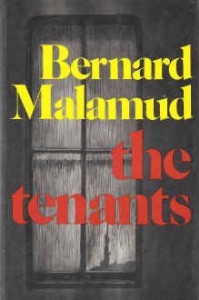The Tenants

Perhaps I should've read Malamud's works in order, because I just jumped through time into a completely different author. I've read Malamud's first two books and loved them; I even loved the crazy debut novel about baseball for crying out loud. Then I stepped over five other books and landed in the 1970s. 1970's Malamud is not the same as 1950's Malamud. Gone is the easygoing, beautiful prose that glimmers; in its place is a noisy, experimental tale that felt more like cocaine on the brain. Hey, it was the seventies.
Had I not known this was written by Malamud, I wouldn't have had the faintest idea from the writing. Maybe I should pretend it wasn't Malamud and approach it as an unknown author. There's some wonderful conflict in this story. The novel is largely about two writers at war with one another. Now, I roll my eyes almost anytime a story is written about writers, but I'll grant each and every author one token to play the writer card (but only one). The characters themselves are sort of cliché, but I think the author did a wonderful job making them believable and original within their caricatures.
Truth is, this story is all over the place. I couldn't tell what was dreams, what was imagined, what was novel. Did any of this really happen? Was some of what I read the novel that was being written by one of these imagined writers? Were there even two writers, or was this all merely the internal struggle of one writer? The author of The Tenants seems angry, confused, and hopeless, a person with a negative view of the world. And this is not how I remember Malamud.
So back to Malamud: I get the feeling that maybe this was a very personal story for the author. I get a sense that maybe his own personal life and writing life were unraveling. There's a sense that everything is falling apart, not only for these characters, but for the author as well. And maybe that wasn't the case, and if so, Malamud did a wonderful job painting chaos without having to be submersed in it. I don't know, I'm just trying to find the positive. Knowing this is Malamud, it sort of sucked, but even if I didn't have preconceived notions of the author, I still would've found The Tenants to be jarring, strained, and little more than okay. So, that being that case, I have decided to get back in my time machine and journey to the year I left off at: 1958. Maybe by the time I read through the sixties, 1970s Malamud will make complete sense. Or maybe it would be better to skip over the seventies altogether.
 2
2



